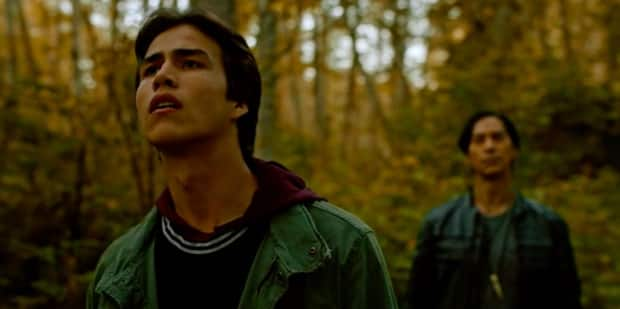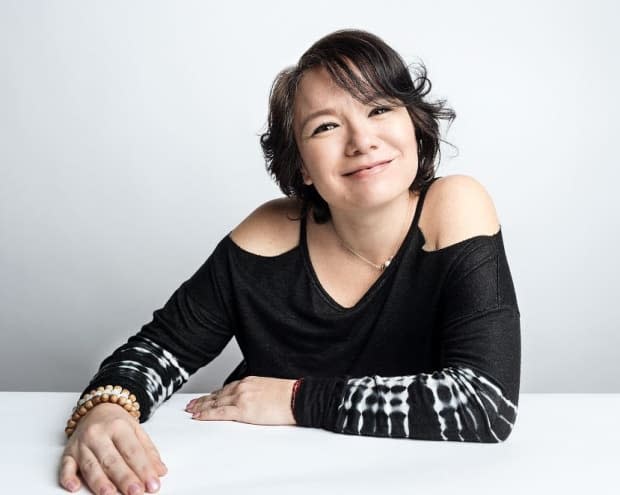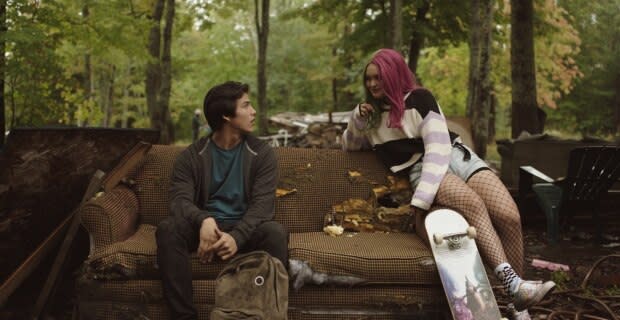TIFF trailblazer Michelle Latimer leads group of Indigenous filmmakers telling their own stories

There's a moment during the shooting of the new documentary Inconvenient Indian — which premiered at the Toronto International Film Festival — that reminded Michelle Latimer why she became a filmmaker.
They were in an art gallery filming The Scream, a painting by Cree artist Kent Monkman that depicts Indigenous children being torn from their parents' arms by the Royal Canadian Mounted Police and carried off to residential schools.
Right as they were filming, an Indigenous family from Gananoque, Ont., entered the room, with a child about the same age as those in the painting.
WATCH | Latimer describes what happened during filming of Inconvenient Indian:
Behind the camera, Latimer watched as the couple's girl reached out to touch the painting and was scooped up by her mother.
"It brought me to tears," Latimer said. She realized, "This is why we document, for these kinds of instances where reality mimics art."
The experience made her think about what has changed.
"A hundred years ago, that child would have been in a residential school," she said. "You do have these moments where you're sitting in the [present] and you realize, the history is right now. The future and the past — it's all right now. That's the idea of the circular storytelling in this culture ...and I feel I've experienced that."

Closing the gap between the history we've been taught in school and the present day reality of the Indigenous experience is much of what Inconvenient Indian explores. Based on the bestselling book by Thomas King, Latimer's film captures a new generation of Indigenous hunters, artists and teachers, rediscovering and reclaiming traditions.
The documentary is part of a larger moment where increasingly Indigenous filmmakers are seizing the narrative to tell their own stories.
Also premiering at TIFF is director Tracey Deer's Beans, an emotional drama that puts the audience in the home of a Mohawk family shaken by the Oka Crisis.
WATCH | The official trailer to Beans, a new Indigenous film set during the Oka Crisis:
Then there's Latimer's other project, the new TV series Trickster, also premiering at TIFF, based on the novel by Eden Robinson. The CBC series follows Jared, a troubled teen battling, quite literally, with his heritage.
For filming, Latimer made hiring as many Indigenous crew members as possible a priority. But she said union restrictions around using talent from different provinces created roadblocks.
"We're working within a colonial hierarchical system and yet, our values traditionally are not like that. So how do you bring an Indigenous point of view to the set?"

For Latimer, whose mother is Métis and Algonquin and father French Canadian, "decolonizing" the set meant budgeting extra time for things such as an opening ceremony with an elder in a paid position as an adviser.
Creating safe spaces
Latimer is fortunate that with both Trickster and Inconvenient Indian she enjoyed full support from her producers. Actor, producer and director Jennifer Podemski has fought her share of battles trying to protect her vision as a storyteller. It can be tiring, she said.

"We're constantly either educating or bringing people together to be culturally aware. It is exhausting work."
Like Latimer, Podemski got her start as an actor appearing in shows, such as The Rez and Moccasin Flats. She says the industry has come a long way since she was in her 20s.
"I was a woman. I was Native. I just came up against a lot of push-back for wanting the big visions that I had."
While Podemski sees more potential today for young women, she says creating a sense of safety even within the Indigenous community is paramount.
"There is a lot of lateral violence in many communities. I want to feel safe, and I know that other people coming up in the industry also want to feel safe. "
To help foster those safe spaces and mentor the next generation, Podemski is launching the Shine Network, a new platform for content by Indigenous women.
Support on set
Having a wealth of Indigenous support on set certainly made a difference for Trickster actor Anna Lambe. The Inuk performer plays Sarah, the new kid in town who hides her own struggles.

Lambe says having Indigenous people as the backbone of the production was really important.
"There was so much mutual understanding and so much mutual respect and kind of an unspoken language of 'I understand what you've been through.'"
For Latimer, now juggling the TV show and documentary, it may seem like it's all happening at once, but she says, "It's actually been like 15, 20 years in the making."
She credits the emergence of organizations such as the Indigenous Screen Office, the support of the imagineNATIVE and broadcaster APTN with helping to create the current conditions.
WATCH | Trickster actors talk about working with mainly Indigenous cast and crew:
With Indigenous stories now seemingly in demand, Latimer isn't ready to rest.
"That's the danger. We can check the box and go, 'Well, we have that representation.' But this is about creating a sustainable future that allows other creatives to come through."
While the current COVID-19 crisis is not an easy time to blaze a trail forward, Latimer sees opportunity in the disruption. She says the pandemic is shifting how people empathize and see their interconnectedness.
"If you look at the history of any pandemic, it's always created massive change."
WATCH | Trailer for Trickster executive produced by Latimer:


